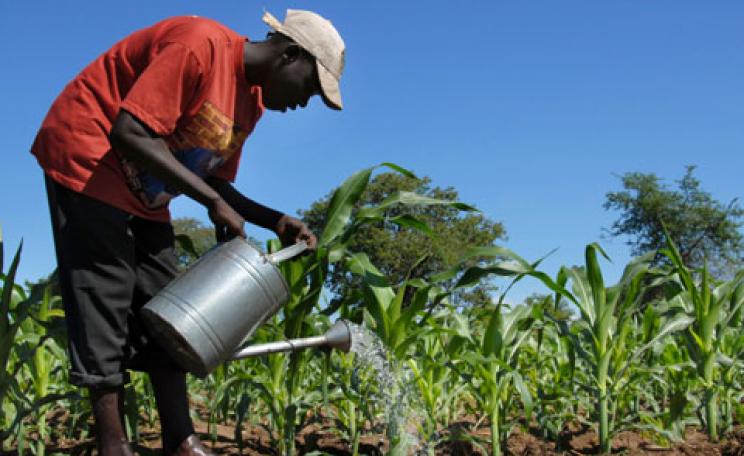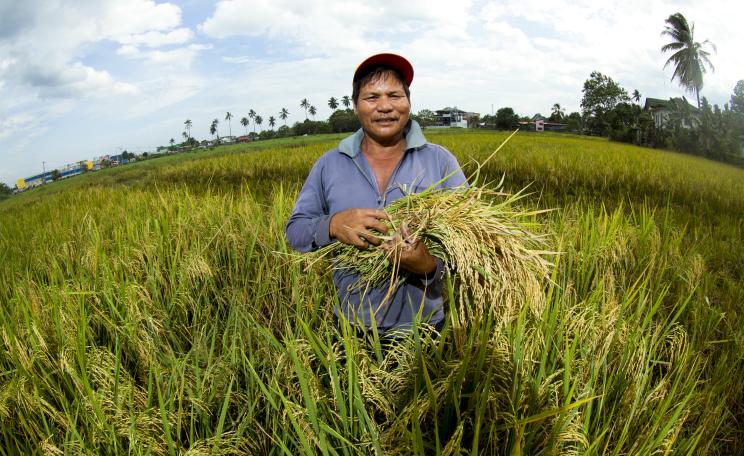Coffee beans: the middle ground?
Coffee is one of the most widely grown crops and a major source of export revenue for many tropical countries - an estimated 100 million people are dependent on coffee for income. The coffee industry in Costa Rica typifies the dramatic shifts towards intensive production practices in the last 35 years.
Large quantities of synthetic inputs have led to increased productivity but also to degraded soils and a growing pest problem (resulting from the removal of native vegetation that would support natural parasites and predators of these pests).
In an attempt to tackle some of these problems, Dr Mark Chandler, International Director of Research at Earthwatch, an environmental and conservation charity, is heading a research project in San Marcos de Tarrazù, Costa Rica, to assess the possibility of implementing a more sustainable approach to coffee bean cultivation.
Using the term 'pro-environmental sustainable practices', Dr Chandler believes that this project is testing a middle ground that could marry the environmental and health benefits of organic farming practices with the economic and food security advantages of industrial methods.
On identifying a problem with its members' crop productivity, CoopeTarrazù, a regional coffee-farming cooperative, invited Earthwatch's scientists to propose a solution to the dilemma of lower yields.
Finding the soil acidity too high, a trial was proposed to test whether using less synthetic and more organic fertiliser on a small patch of land could restore the soil's balance and nutrient levels.
What do you think? Comment here
Preliminary results have been positive: 'We found that excess fertiliser application did lead, in fact, to an acidification of the soils. With the acidification of the soils there were fewer nutrients available for the plants,' says Dr Chandler.
The study also managed to discount the simple relationship between fertiliser application and increased yields put forward in agricultural textbooks. After an initial spurt in crop growth and productivity, findings show that continued fertiliser application can be counter-productive, as it reduces the fertility of the soil through the presence of excess nitrates.
Tree planting
With such positive results evident from the reduction in the use of synthetic fertiliser, I asked Dr Chandler why the project did not extend to cutting down on other petrochemical agents such as pesticides and herbicides, or take the more extreme step and convert to organic.
'Organic has very specific standards and we're less interested in those standards,' explains Dr Chandler, referring to the strict guidelines necessary to acquire organic certification.
Nonetheless, the research is also looking at ground cover crops and trying to access funding for carbon sequestration, which would provide farmers with the incentive to plant trees on their land:
‘The trees are needed for a healthy environment and to increase crop production,' says Dr Chandler, 'but individual farmers may not make that change, and that's where...this kind of financing can help them get to those long-term solutions.'
Biodiversity could benefit too: pollinators, such as bees and wasps, are essential for the cultivation of any crop, so providing them with enough of a natural habitat to thrive in could be beneficial to coffee bean yields.
What next?
There are plans to expand the project into other regions and crops, but at present the feasibility of the research relies on smallholder farming and the willingness of local cooperatives and farmers to participate.
Aside from the concept of the multi-functional ecosystem, Dr Chandler believes that better communication along the entire supply chain is important when thinking of the environment and sustainability.
This is why Earthwatch's volunteer conservation programme is described by Dr Chandler as the 'essence' of the project - it brings together farmers, sellers, and consumers to support solutions that can be beneficial to all three.
However, since by its nature sustainability implies a restriction on the consumption of natural resources, the project's sponsorship by coffee conglomerate Starbucks raises questions as to what extent this model can be regarded as 'sustainable'.
Admitting that the partnership with Starbucks can be a downside with regard to independent research, Dr Chandler was quick to defend the advantages brought by the sponsorship deal. Starbucks, he said, was able to act as a gatekeeper, enabling the scientific team to gain access to the coffee-farming community.
'Independent of needing to produce a lot more food, even producing the amounts of food we have today is still not sustainable, so we need to look at production systems themselves and make them more sustainable,' says Dr Chandler.
| READ MORE... | |
 |
HOW TO MAKE A DIFFERENCE Beekeeping for ecology, economy and food security Bees Abroad, a UK beekeeping charity, has initiated a project to train and support Malawian beekeepers. Find out how you can help... |
 |
INTERVIEW Bill Jordan: I don't think organics will feed the world Jordans cereals founder Bill Jordan says his company's method of farming can feed the world and safeguard biodiversity |
 |
INTERVIEW Gathuru Mburu: Kenya has already had a Green Revolution Forget trying to grow hybrid maize - Africa already has all the crops, storage systems and knowledge that it needs to grow itself out of poverty |
 |
HOW TO MAKE A DIFFERENCE CASE STUDY: fighting food multinationals in South America In the Brazilian town of Santarem, one brave priest is the only thing standing between multi-national grain trader Cargill and the rest of the Amazon |
 |
INVESTIGATION Who needs Africa's land more: us or wildlife? An explosive mix of animals, people and economics means that land in Africa is becoming more valuable - and more contested - than ever |








